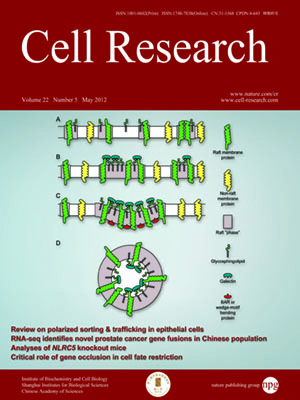
Advanced Search
Submit Manuscript
Advanced Search
Submit Manuscript
Volume 22, No 5, May 2012
ISSN: 1001-0602
EISSN: 1748-7838 2018
impact factor 17.848*
(Clarivate Analytics, 2019)
Volume 22 Issue 5, May 2012: 873-885
Seunghee Bae1,*, Sun-Yong Kim1,*, Jin Hyuk Jung1, Yeongmin Yoon1,2, Hwa Jun Cha1, Hyunjin Lee1,2, Karam Kim1, Jongran Kim1, In-Sook An1, Jongdoo Kim
2LIFEnGENE, Inc., Konkuk University, Seoul 143-701, Korea
3Laboratory of Radiation Tumor Physiology, Korea Institute of Radiological and Medical Sciences, Seoul 139-706, Korea
4Laboratory of Functional Genomics, Korea Institute of Radiological and Medical Sciences, Seoul 139-706, Korea
5Department of Chemistry, Hanyang University, Seoul 133-791, Korea
6Division of Radiation Effect Research, Radiation Health Research Institute of KHNP, Seoul 132-703, Korea
7Laboratory of Molecular Oncology, Cheil General Hospital and Women's Healthcare Center, Kwandong University, College of Medicine, Seoul 100-380, Korea
Correspondence: Sungkwan An,(ansfgrc@konkuk.ac.kr)
The serine/threonine kinase Akt functions in multiple cellular processes, including cell survival and tumor development. Studies of the mechanisms that negatively regulate Akt have focused on dephosphorylation-mediated inactivation. In this study, we identified a negative regulator of Akt, MULAN, which possesses both a RING finger domain and E3 ubiquitin ligase activity. Akt was found to directly interact with MULAN and to be ubiquitinated by MULAN in vitro and in vivo. Other molecular assays demonstrated that phosphorylated Akt is a substantive target for both interaction with MULAN and ubiquitination by MULAN. The results of the functional studies suggest that the degradation of Akt by MULAN suppresses cell proliferation and viability. These data provide insight into the Akt ubiquitination signaling network.
Cell Research (2012) 22:873-885. doi:10.1038/cr.2012.38; published online 13 March 2012